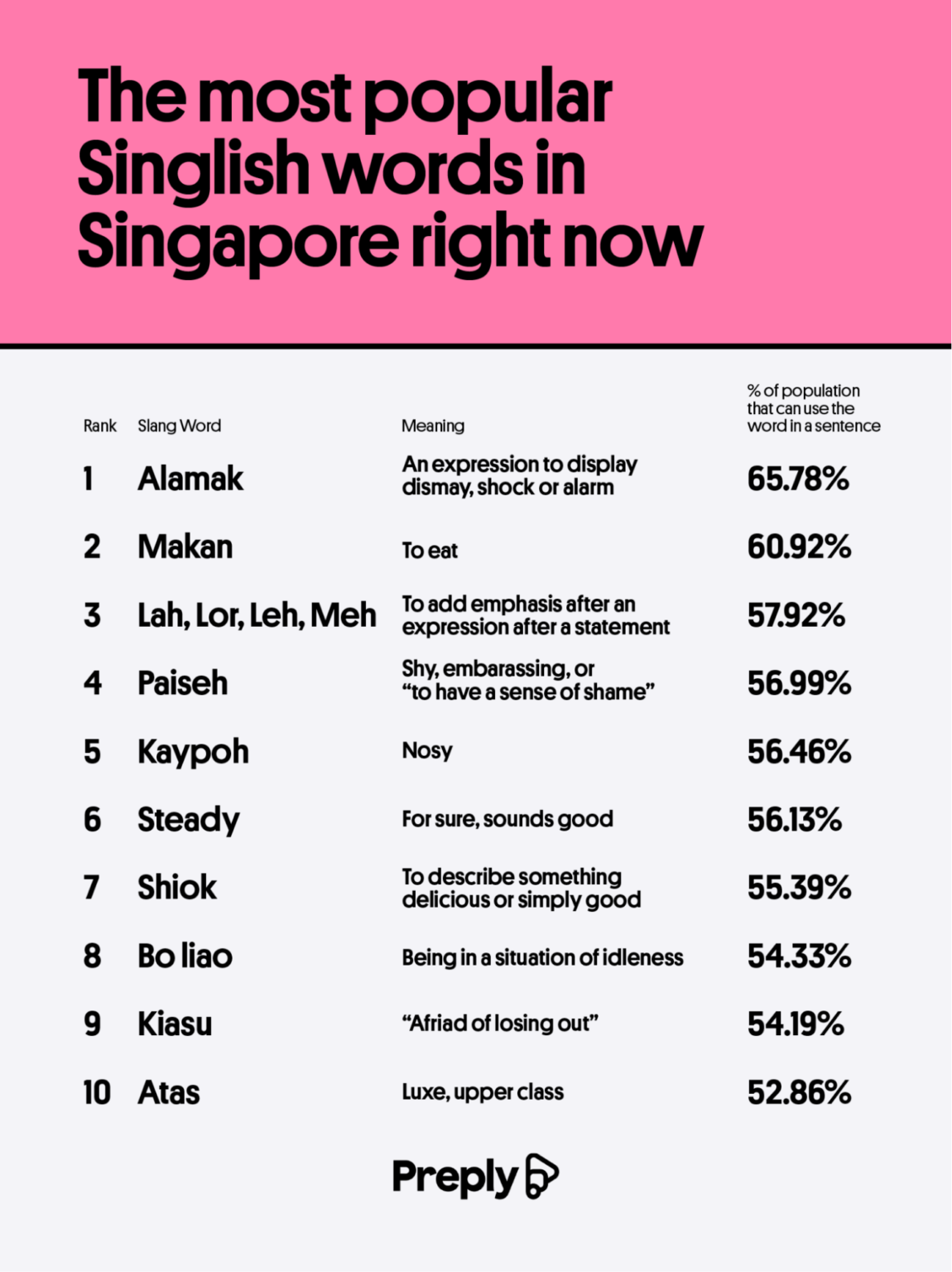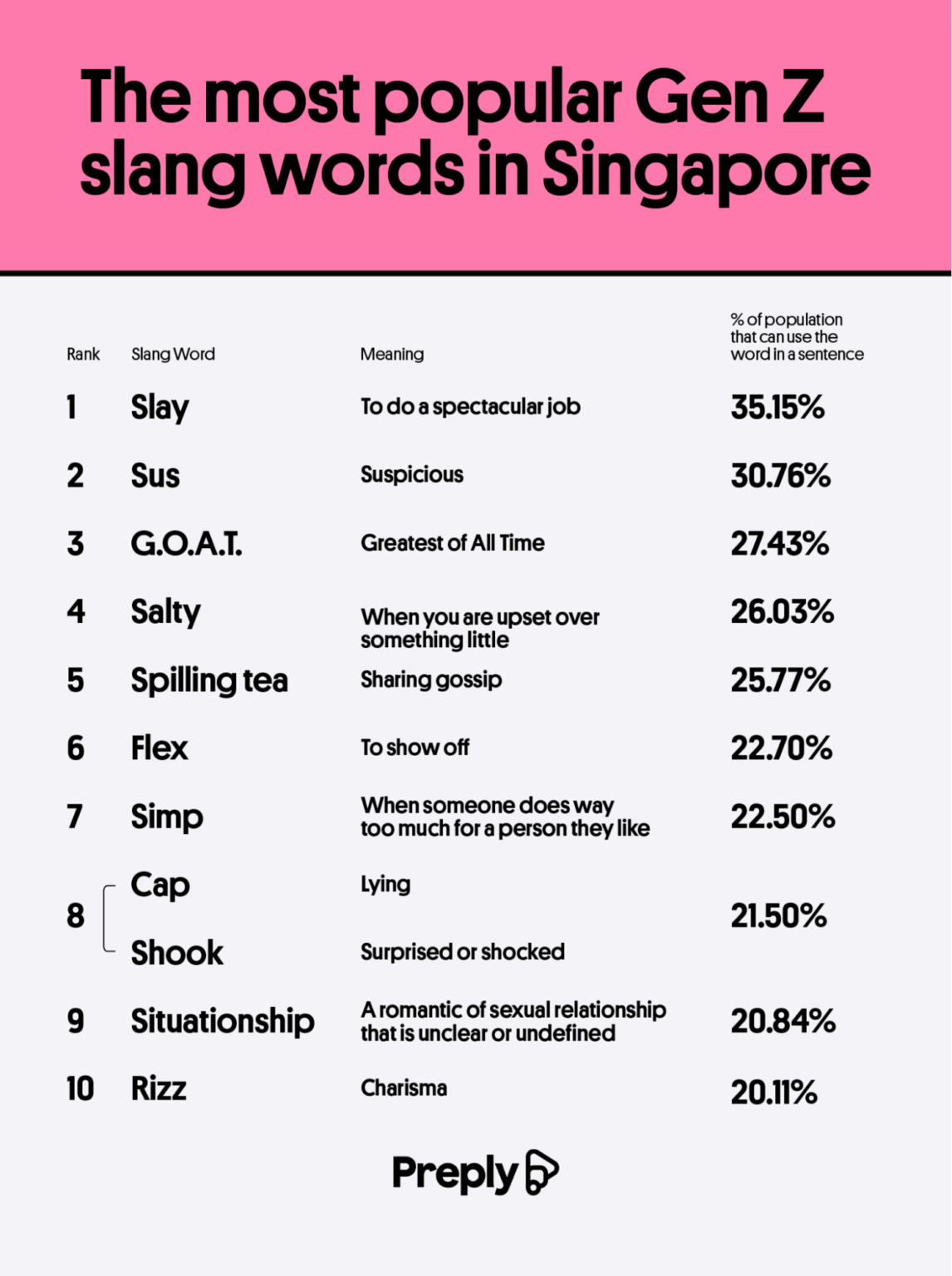What do you think is the most-used Singlish term?
Some might say “paiseh”, an expression of embarrassment; or “rabak”, referring to a messed up or out-of-control situation; but as you’ve read in the headline, it’s “alamak”.
Singlish is a local spin on English, incorporating phrases from Chinese, Malay, and other languages here.
“Alamak” is the Most-Used Singlish Term
A study by Preply, an online language-learning company, found that 95% of Singaporeans use Singlish slang in some capacity, and 33% say they do so in almost every conversation.
Preply surveyed over 1,500 Singaporeans aged 16 to 55-plus for this study.
They found that a third of Singaporeans use Slang as it helps them to communicate quickly, while 19% admit it’s because it’s popular. A further 19% also say it allows them to express their feelings.
After all, saying “wow that’s really good” does not have the same energy as saying “swee lah!”
“Alamak”, which is used to express shock or dismay, is the most popular Singlish term used.

The second most-used term is “makan”, which means to eat. As people living in a small country with limited exciting things to do, going to “makan” is definitely a very common activity among friends and loved ones, so it’s not surprising this term ranks so high on the list.
“Makan” is followed by common fillers “lah”, “lor”, “leh”, and “meh”, typically used for emphasis. These fillers are the third most-used form of Singlish.
According to the study, 66% of respondents were able to use “alamak” in a sentence.
Alamak, you mean one-third can’t?
“Alamak” was also used by American superstar Taylor Swift’s backup dancer Kameron Saunders on stage during her fourth show at the National Stadium on 7 March.
Saunders used a different Singlish term on all six nights of Swift’s performances in Singapore, including “walao eh” and “wah piang eh”.
Sabrina Carpenter, Taylor Swift’s opening act for Singapore, also used the term “walao” during her “Nonsense” outro on 8 March. At the end of her song “Nonsense”, she delivers three lines that incorporate the country’s name.
“Do boys like you more when you’re ignoring them? If I don’t make d*ck jokes am I boring them? I said “WALAO”, am I Singaporean?”
@booboodaddy.yy 🇸🇬 NIGHT 5 NONSENSE OUTROOO #sabrinacarpenter #nonsense #nonsenseoutro #erastour #foryou ♬ original sound – a fool
It seems foreigners are having fun using Singlish too.
Preply’s study found that “paiseh”, “kaypoh”, meaning nosy; and “shiok”, an expression for something good or delicious, were among the top 10 Singlish words.

Preply’s language expert Sylvia Johnson said: “Getting up to speed on the local slang is a big part of learning a language and fitting in with the locals. It demonstrates not just linguistic competence but also cultural sensitivity.”
In fact, the study found that one in six expats in Singapore say they use slang to fit in.
Confusion Over Gen Z Terms
Preply also investigated how familiar respondents are with Gen Z slang, which is used globally.
The study found that 30% of Singaporean residents say they never use Gen Z slang, and half prefer Singlish slang over Gen Z terms.
Nearly 65% of respondents did not know how to use “slay” in a sentence, despite it being the most understood Gen Z word according to the study.
The second most understood word was “sus”, which is short for suspicious. Roughly 70% of respondents were unable to use this word.
The term “sus” grew in prominence due to the multiplayer online game Among Us, where team players have to vote out a suspected imposter as they complete challenges.
The game was extremely popular in 2020 due to many being stuck at home due to COVID-19, though the game still has a considerable number of players today.
“G.O.A.T”, which stands for Greatest Of All Time, was ranked third. About 27% of respondents are able to use this term in a sentence.
An example of such a sentence is simply, “He’s the goat.”
Nearly 80% of respondents are unable to use terms like “rizz”, which is slang for charisma; “cap”, which means lying; and “simp”, which refers to people who overcompensate for a person they like.
An example of a simp would be a guy who buys a girl a bouquet of 100 glitter roses after he saw her once in the class next to his. This is an exaggeration but you get the point.

Some are saying Gen Z slang is getting out of hand.
this picture is a magnitude 13.0 cuntquake on the mother scale… pic.twitter.com/W3Zu3C1Ahw
— phil,🇵🇸 (@thehomiehopper) October 12, 2023
The caption, “this picture is a magnitude 13.0 cuntquake on the mother scale” simply means that the women in the picture look stunning.
There’s a little too much lore behind this type of phrasing to explain but you get what I mean – Gen Z slang seems to be becoming an entirely new language that many aren’t able to understand or keep up with.
Usage of Gen Z or Singlish Slang in Singapore
Slang tends to originate among young people, so it’s far more popular with the younger generations compared to the older generations in Singapore.
As younger people tend to be on social media more than the older generation, it’s also easier for younger people to be exposed to new slang and pick it up very quickly.
About 36% of those aged between 16 and 24 say they use Singlish slang in most conversation, and a quarter use it in every conversation. On the other hand, 22% of those over 55 say they use it very sparingly.
On the topic of Gen Z slang, 32% of 16 to 24 year olds say they use it in most conversations, while 61% of the over 55s never use this type of slang.
It would be a bit funny to hear your Ah Ma say, “Slay queen, you ate”.
Most of the respondents indicated that they use slang in casual settings, like when with family (60%) and friends (80%).
85% of Singaporeans also said they use slang at work, although 74% of respondents indicated it is inappropriate to use slang in a professional setting. However, only 16% do so often.
47% of respondents said they would use it with their co-workers, but only 12% of them would use it in front of their boss.
You must be really close to your boss for that to happen.
Johnson notes that “79% of people worry about using slang incorrectly, and a further 65% use slang without knowing what it means.”
How does that work? Have you heard people use slang in the wrong context?
“This chicken rice is so good, rabak sia!”
“I failed my Chinese exam, so shiok.”
“My girlfriend broke up with me.” “Steady lah bro.”
Ok, maybe the second sentence would make sense only if you’re from ACS (where students are known for failing Chinese) and you’re not a gangster.
Whether or not you use slang, it seems it’s here to stay. It sort of contributes to many Singaporeans’ sense of belonging and really builds kampong spirit.
Although you may not be the biggest fan of Singlish, and may think it’s cringe, it can help you connect with others here.
If you’re one of the people who refuse to use Singlish because you think it’s too “uncivilised”, just give it a shot and lose the “atas” energy.
Relak lah bro.
Would you be jailed for being half-naked in public? Well, the answer will shock you. Seriously. Watch this to the end and you'll understand:




